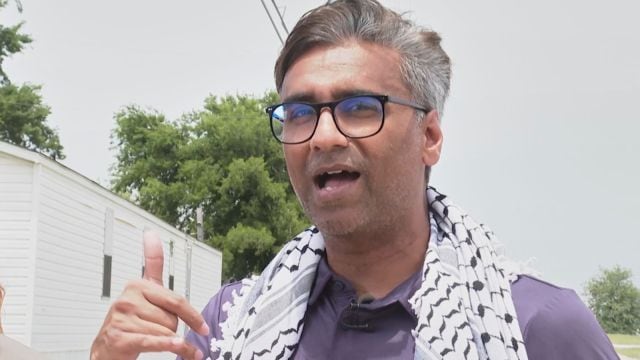Stay updated with the latest - Click here to follow us on Instagram
‘Was chained… made a subhuman out of me’: Indian scholar Badar Khan Suri, who was held over ‘Hamas ties’, released
“There was no charge, there was nothing,” Khan Suri reportedly said after his release.
 Badar Khan Suri, a Georgetown University scholar from India, speaks after he was released from immigration detention facility in Alvarado, Texas. (AP Photo)
Badar Khan Suri, a Georgetown University scholar from India, speaks after he was released from immigration detention facility in Alvarado, Texas. (AP Photo)In a case that has drawn attention towards civil liberties under immigration enforcement, Badar Khan Suri, a postdoctoral scholar and professor at Georgetown University, was released from federal custody following a judge’s ruling that his detention violated constitutional rights.
Held since March at the Prairieland Detention Center in Texas, Khan Suri walked free Wednesday afternoon after US District Judge Patricia Giles of the Eastern District of Virginia ruled that his arrest and continued detention contravened both the First Amendment and the Fifth Amendment of the US Constitution. As reported by NBC News, Giles concluded that the government had provided no substantial evidence that Khan Suri posed a flight risk or a danger to the public.
“There was no charge, there was nothing,” Khan Suri told NBC News after his release. “They made a subhuman out of me.”
The case began when the Department of Homeland Security (DHS) accused Khan Suri of promoting antisemitism and disseminating Hamas propaganda online. A DHS spokesperson also alleged he had “close connections to a known or suspected terrorist, who is a senior advisor to Hamas,” NBC News reported. However, court documents indicate that these claims stemmed largely from Khan Suri’s marriage to Maphaz Ahmad Yousef, an American citizen from Gaza and a student at Georgetown. Her father, Ahmed Yousef, a former adviser to Hamas leader Ismail Haniyeh, has been publicly critical of Hamas and has not held the role for over a decade.
 Mapheze Saleh, center, wife of arrested and detained Georgetown University scholar Badar Khan Suri, listens as senior immigrant rights attorney at ACLU Virginia Eden Heilman, right, speaks during a press conference about her husband’s release. (AP Photo)
Mapheze Saleh, center, wife of arrested and detained Georgetown University scholar Badar Khan Suri, listens as senior immigrant rights attorney at ACLU Virginia Eden Heilman, right, speaks during a press conference about her husband’s release. (AP Photo)
According to NBC News, the government attempted to move the case from Virginia to Texas, arguing that the habeas corpus petition should be filed where the petitioner is held. Judge Giles rejected that motion, citing the unclear jurisdiction at the time of filing, since Khan Suri had been transferred multiple times between detention centres.
In his first public remarks since regaining freedom, Khan Suri recounted his treatment in custody. “For the first seven, eight days, I even missed my shadow,” he told NBC News. “It was Kafkaesque, where they were taking me, what they were doing to me. I was chained — my ankles, my wrist, my body. Everything was chained.”
Court documents reviewed by NBC News detail that Khan Suri was initially placed in a facility’s “TV room” without a proper bed and subjected to blaring television from 5 am to 2 am. He received halal meals only after five days and was placed in a red uniform typically reserved for high-security detainees.
“On April 2, officers came and told him that he had complained through his lawyer about his religious accommodations and asked him for more details. After Dr. Khan Suri reaffirmed his needs, he was given a prayer mat, a Quran, and provided a space on a bed in the dorm, outside of the TV room,” the petition stated.
 Mapheze Saleh, right, wife of arrested and detained Georgetown University scholar Badar Khan Suri, holds a sign calling for her husband’s release, May 1st. (AP Photo)
Mapheze Saleh, right, wife of arrested and detained Georgetown University scholar Badar Khan Suri, holds a sign calling for her husband’s release, May 1st. (AP Photo)
Suri’s detention came after a limited number of social media posts in which he expressed support for Palestinian civilians and criticized US policy in Gaza. According to NBC News, the court documents note that Khan Suri has never attended protests nor made statements supporting Hamas or antisemitism. “I came to the US to work and raise my family: I go to work, come home late, and still they came and took me and broke my family,” he said in a statement to NBC News.
During his time in custody, Khan Suri said he was most concerned about the emotional toll on his children. “My eldest son is only nine, and my twins are only five,” he told NBC News. “My nine-year-old knows where I am. He was going through very rough times. My wife used to tell me that he was crying. He needs support from mental health.”
Maphaz Ahmad Yousef, speaking at a separate news conference in Virginia, told NBC News, “I can’t wait for the moment when my husband will reunite with my children. It’s a victory, a victory for all of us, a victory for justice.”
She added that her husband never regretted his support for Palestinians. “Badar told me, ‘If my suffering in the detention centre is because I married to a Palestinian and because I spoke out against the genocide in Gaza, then I should wear it as a badge of honor,’” she said.
The American Civil Liberties Union, which represented Khan Suri, emphasized the broader implications of the case. “Americans don’t want to live in a country where the federal government disappears people whose views it doesn’t like,” ACLU attorney Sophia Gregg told NBC News. “If they can do this to Dr. Suri, they can do this to anyone.”
Khan Suri said he holds no resentment. “There is madness everywhere, but it shouldn’t be in the United States of America,” he said. “This is a bastion of hope.”



- 01
- 02
- 03
- 04
- 05




























